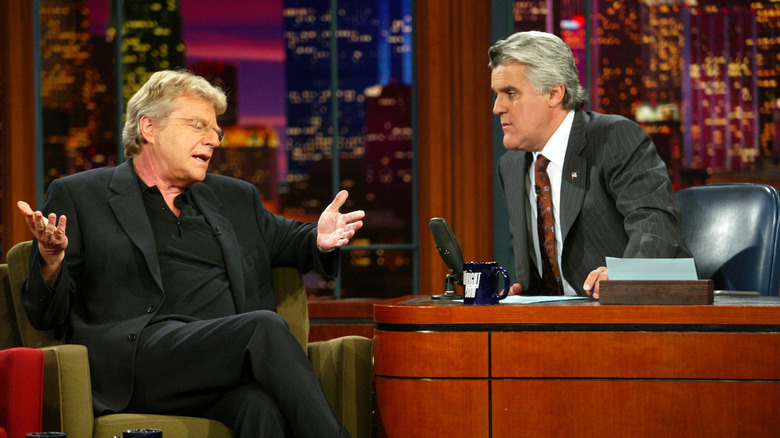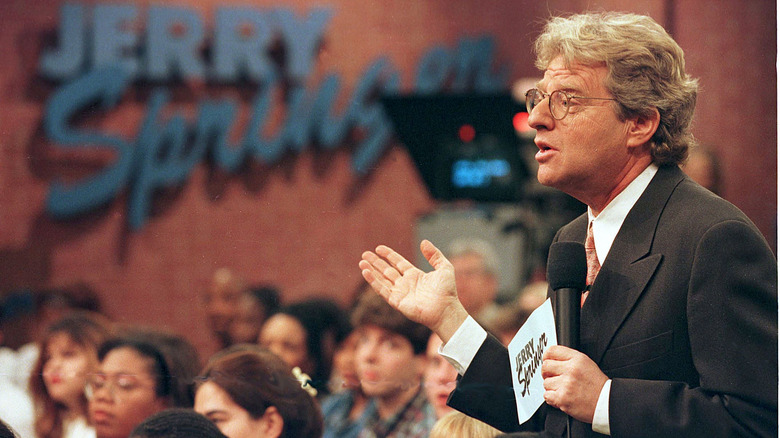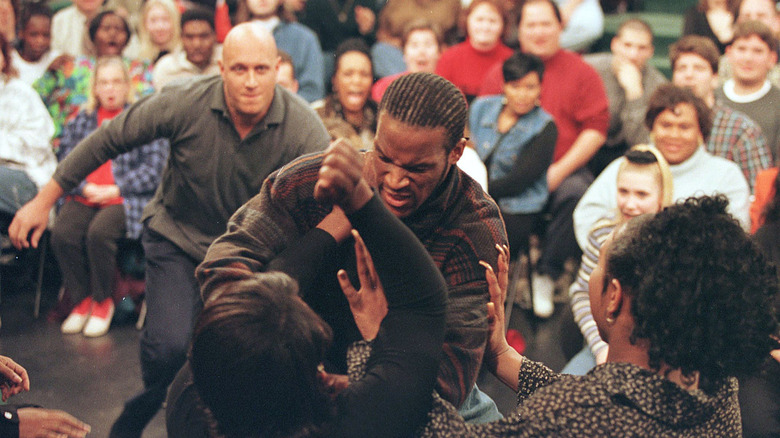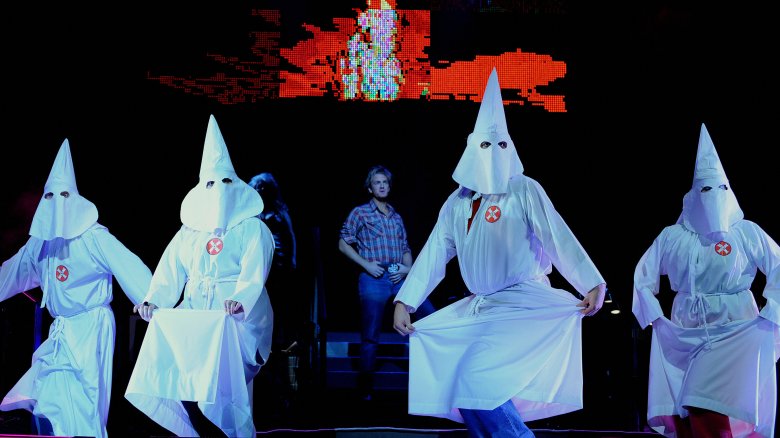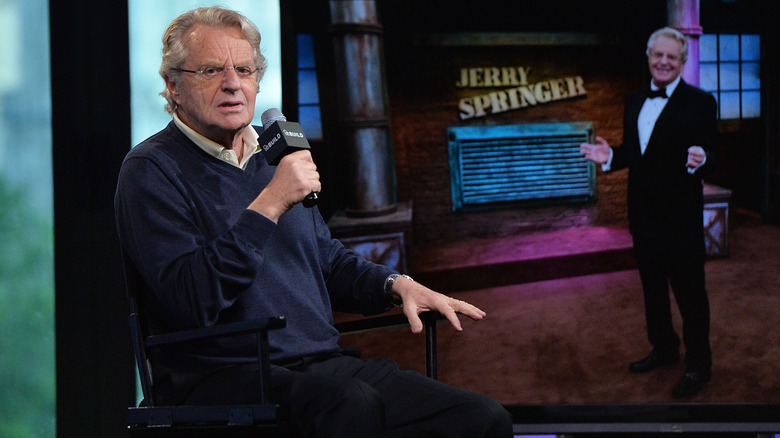The Untold Truth Of Jerry Springer
During the 1990s, "The Jerry Springer Show" began titillating TV viewers with a cavalcade of guests bearing (censored) breasts, sloppy fights, and bleep-riddled, potty-mouthed outbursts. It allowed anyone so inclined to indulge in the id of human relationships in all its tawdry, torrid, and shamelessly sensationalized glory. Critics disparaged the show as an embarrassing blemish on the television landscape, the lowest of lowbrow entertainment. Fans welcomed it as a reprieve from "normal," a delightfully depraved oasis in the desert of vanilla programming. Whatever your take, there's no denying that "Jerry Springer" and its eponymous host left a lasting impression on American culture.
But there's more to Springer's story than televised smut run amok. Before his death on April 27, 2023, aged 79, he lived a very interesting life. So buckle up and start belting out those "Jerry!" chants. You're in for a wild ride.
Springer the political zinger
If Jerry Springer's show was a person, it would be legally old enough to binge drink. There are full-grown adults who can't remember a time when Springer wasn't the Oprah of fistfights and nudity because they hadn't been born yet. Some might know he was the mayor of Cincinnati, but most probably know little else about his political career. For example, did you know Springer sat on the city council in the early 1970s and didn't punch his way to power? Instead, he impressed voters with his likability and hippy-hearted gumption.
"This American Life" producer Alex Blumberg lived in Cincinnati during Springer's political ascension and had this to say on an episode of the podcast: "Nobody had ever heard of him. But he was against the war in Vietnam, and he supported civil rights. And here's the thing you might not guess: he was fantastic." Another Ohioan compared Springer to Robert Kennedy. A third admired his "guts" and cross-party appeal.
As WCPO Cincinnati recalled, Springer hit a home run on his first political at-bat in 1971, getting elected to the city council. He then got reelected in '73. Springer was a man with both bell bottoms and moxie, enough moxie to steal a bus to make a point (and he did when officials usurped the local bus system). He spent weekends chatting with average Cincinnatians, a weekday working with garbage men, and a night in jail commiserating with inmates.
Jerry the john
Long before Americans blushed at the dirty deeds of dudes like David Vitter and Elliot Spitzer, Jerry Springer had his own awkward scandal. As WCPO Cincinnati detailed, back in December 1973 and January 1974, then-Councilman Springer went to a Kentucky health club to get healed Marvin Gaye style. On both occasions, he paid by check, which made him pretty easy to nail when cops finally dropped the hammer.
It may have been the '70s, but even in the age of free love and affection, paying a sex worker still earned negative attention, especially for Springer, who had just won reelection. He was also set to become the nation's youngest mayor following the next election cycle, but that plan quickly died. After initially forgiving Springer, the city council unceremoniously ousted him. He publicly resigned before his sobbing wife and an army of journalists.
True to his name, Springer sprang back the next year, once more getting elected to city council and later becoming mayor. But when he unsuccessfully ran for governor in 1982, opponents dredged up and distorted his past. Per The New York Times, health club incidents became a motel romp with three others. Naturally, opponents claimed he wrote a "bad check." (Although legally, there was no "good check" he could've used to pay a sex worker). Springer classily responded in an ad, facing the truth "even if it hurts." Unfortunately, the truth probably hurt his chances.
From news anchor to news headline
Springer's political career had been a mélange of cunning, caring, and catastrophe. Despite falling from grace, he refused to remain crestfallen. Instead, he felled the tree of turmoil and grew as a candidate. Even when he fell short of becoming governor, he didn't just retreat from the limelight to lick his wounds. In lieu of lying low, Springer became a newscaster.
As Springer told the Columbia Journalism Review, he never chased his chance to work in news. Rather, NBC pegged him as someone Cincinnatians would trust and basically handed him his first job in TV journalism. Like a moss-less stone, he rolled with it and ultimately rocked at what he did. Ever the professional, Springer refused to let his liberal leanings slant how he reported the news, even when discussing politicians he disagreed with. However, he still got his two cents in the final minutes of the show. (Sound familiar?)
This American Life explained that with NBC's blessing, Springer concluded his newscasts with a commentary segment that included the now-iconic catchphrase, "Take care of yourselves and each other." Viewers took to the segments, which took Springer to the top of the ratings ladder. During his 10 years as a broadcaster, he won a dominant 10 Emmys. Then a new opportunity landed in his lap: the chance to host a talk show. Ironically, Springer's on-air wholesomeness led to him becoming the poster child for tawdry entertainment.
The birth of 'The Jerry Springer Show'
"The Jerry Springer Show" first aired in 1991, and it was a slow-motion rollercoaster of meh. As The Independent described, the first episode featured under-the-top guests like Oliver North and Jessie Jackson. It contained as much adrenaline as a sleeping pill, and the ratings reflected that. That's why, according to The Washington Post, producer Richard Dominick tried to put some pep in the show's step by focusing more on unorthodox lifestyles. The hope was that college-aged viewers would lap it up like cheap beer.
However, in the early going, Dominick often got shock-blocked by higher-ups. When Universal Television took over in 1994, the gloves finally came off. After getting greenlit to "do [his] show," Dominick required Springer and company to focus on increasingly crazy stories. Springer gladly obliged but also admitted his show's bellicose antics and brazen braless-ness don't really appeal to him. He bluntly described the show to CNN as "silly, crazy," and lacking in any "redeeming social value other than an hour of escapism."
You might be wondering why Springer didn't just strike a more palatable balance with his producers so he might like his own show more. It's purely a matter of dollars and cents, which makes sense. Springer informed USA Today that "What the affiliates are buying is a show about craziness." He was contractually barred from tempering the mayhem, making Springer both a cog and the wheel.
So just how fake is the show?
Jerry Springer's show found a curiously high number of humanoid cartoon characters who like vaunting their oddness. Sure, everyone knows somebody weird, perhaps a friend who licks their left hand too often or an aunt with a potato fetish. But are really there enough men who've proudly married horses to fill up a quarter-century of shows? How many people actually swing their fists like confused octopi the second they get upset? Obviously, the guests are acting, right?
Well, yes and no. Springer addressed the issue in 1998 amid accusations of wholesale fakery. He told the Associated Press (via Time) that the show doesn't permit made-up stories. On the topic of punching, he explained that fights are discouraged but that guests "are encouraged to be animated and get into people's faces." (So guests are asked to stand at an eroding precipice of violence without actually getting physical. Nope, not a mixed message at all.) Springer also tellingly remarked that the show has "no obligation" to depict reality.
Vice contributor Harmon Leon tried to test the show's vetting process by telling the Big Mac of whoppers. In a mock bid to get on "The Jerry Springer Show," he claimed to have "a meth-addicted boyfriend who was having too much anonymous sex on Grindr." Allegedly, a producer asked Leon to spice up the story by recruiting a made-up Grindr user before inexplicably chanting "Jerry!" Overall, Leon likened the show to the WWE.
The guests who got one over on the show
Harmon Leon's Vice piece presented "The Jerry Springer Show's" vetting process was willfully lax and prone to perfidy. If his account is accurate, it raises the obvious question of how many people pulled the wool over producers' winking-closed eyes. While it's impossible to know the final tally, some beguiling guests were exposed while others openly bragged about their bull.
Arguably, the most infamous deception came at the hands of four Canadian comedians in search of a good laugh. The Chicago Tribune explained that the maple leaf quartet pretended to be a pair of couples in a love rectangle. Their con was simple but compelling: a husband cheated on his unwitting wife with a babysitter who had a boyfriend. A tale of two villains and two victims proved too juicy to pass up. The episode aired in February 1995, the winter of Springer's discontent. Canadian viewers caught on, and Springer's producers got caught off guard.
The show had paid the phony foursome's travel expenses, but the costs were potentially much greater. Even a business known for sleaze has a reputation to uphold. Springer's program needed to look legitimately ludicrous, but the comedians had turned it into a joke. Clearly unamused, the show's owners sued the hoaxers for $50,000. Per The Montreal Gazette, the parties settled out of court, but not before exchanging some nonphysical jabs.
When the unreal got too real
It's easy to forget that amid the sham guests and hammy hijinks, Jerry Springer's show still showcases real people with real problems. At times, this fact has proved really problematic and downright tragic. On more than one occasion, program participants have admitted or later committed heinous acts, illustrating just how un-fake staged conflicts can be.
When 24-year-old wife and mother Dawn Marie Eaves appeared on the show in 1998, she had an untoward secret to share: an illicit affair with an underage teen. The AP reported that a court banned the unabashed offender from seeing the boy and sentenced her to five years probation after she outed herself on television. Unwilling to let sleeping crimes lie, Eaves met up with him again, prompting her arrest.
Two years later, Springer guest Ralf Jurgen-Panitz murdered his ex-wife, Nancy Campbell-Panitz, mere hours after watching the episode featuring him and his soon-to-be victim. According to The Guardian, Jurgen-Panitz had continued living with his ex after their divorce, despite secretly marrying someone else. He chose Springer's show as the venue to drop that bomb, which inevitably caused a blow-up. Campbell-Panitz later kicked them out of her home. Jurgen-Panitz watched their falling-out play out on TV as he got homicidally drunk at a bar. Incensed and intoxicated, he vented by viciously striking and strangling his former life partner.
Campell-Panitz's son sued "The Jerry Springer Show," holding it responsible for the killing, but later dropped the suit.
Springer the singer
Yes, Jerry Springer made a country album. For that, you can blame his daughter.
Springer explained the inspiration for his 1995 album, "Dr. Talk," during a 1996 interview with The Chicago Tribune. According to the sensationalist but unsensational singer, while taking his daughter to a country show in Nashville, it occurred to him "that the subject matter of country music is the same subject matter as talk shows." Somehow Springer figured that he, too, could become a twang-slinger. Per Entertainment Weekly, he came up with the CD's title track (which sang the praises of talk shows) while sitting on an airplane. His singing career, however, never took off.
In 2009, Springer dusted off his vocal cords in hopes of striking the right chord with Broadway. Despite previously joking that he needed his own Milli Vanilli, he agreed to play morally mixed lawyer Billy Flynn in the musical "Chicago." The New York Times noted the role's biographical significance; Springer worked as an attorney before turning to politics. Springer portrayed the part as a fitting representation of the various hats he's worn in life: "A little fact and a little fiction, that's every job I've ever had, to tell you the truth."
Jerry Springer: The Opera
"The Jerry Springer Show" was basically a salacious soap opera without the soap. It was dramatically dirty in captivating ways and way too theatrical not to imitate onstage. And since a soap-free soap opera is really just an opera, it's only logical to add music, singing, and stylized haranguing to "Jerry Springer."
Written by Stewart Lee and Richard Thomas, "Jerry Springer: The Opera" debuted at London's National Theater in 2003, per The New York Times, and earned Britain's Olivier Award for Best New Musical. The Guardian provided a scintillating glimpse: "The show contained more than 200 swear words and depicted God, Jesus Christ, Mary, Adam and Eve, and Satan as warring guests on a special edition of the Jerry Springer show set in hell." Critics adored it. Christians, by contrast, abhorred it.
In 2005, a Christian group unsuccessfully sued BBC head Mark Thompson for blasphemy after he allowed the show to air on television. Various American Christians also got cross. According to the Cleveland Plain Dealer, organizations like America Needs Fatima and the Catholic League condemned the show. The uproar upended plans for a Broadway run, which was delayed for a decade.
Jerry Springer had a more mixed reaction, telling The AV Club that the musical was well done but uncomfortable to sit through. It wasn't the irreligious snark or tap-dancing Klansmen that bothered him. Rather, it was seeing himself portrayed onstage while others watched.
Springer the man vs. Springer the showman
It's no secret that Jerry Springer didn't watch his own show. In a way, that made him the perfect person to host it. He acted as the grounded foil to a parade of preposterous people, dispensing sober moments of truth while TV audiences drank up the insanity. But he was not merely the winking straight man in an absurdist comedy act. Per The Daily Beast, the real Springer wore his blandness on his sleeve.
At that point a married grandfather, Springer led a "very normal" existence and preferred to keep his private life just that, private. Of course, normal people sometimes do outrageous things with their privates, hence their desire for privacy. That certainly seemed true of Springer back in 1998. As The New York Daily News elaborated, a British tabloid reported that he had relations with adult film star Kendra Jade and her stepmother in front of a camera. He threatened to sue the paper.
When asked by The Daily Beast whether a tape of his tryst exists, Springer gave a non-denial denial: "I would hope not. I would never want to be in that kind of movie." Perhaps that sentiment partly accounts for his show's success. Viewers loved seeing lunacy but hid their own straitjackets. After all, the best indignities happen to other people.
He took Judge Jerry very seriously
After the end of "The Jerry Springer Show," it wasn't the end of Jerry Springer's place on television screens across the nation ... in spite of the fact that he told the New York Post that he had thought the end of the show heralded his retirement. "Judge Jerry" ran for three seasons, and it wasn't just a gimmick: Originally having a background in law, he went and got certified as a judge in what he described as "the first grownup job I've had in 30 years."
In spite of the fact that reviews for the show weren't great, Springer said that it was a ton of legitimate work put forth on legitimate cases. He explained to the Post that the people who appeared on the show had filed real grievances, and he did very real prep: One week would be spent hearing — and filming — as many as 35 cases, and the next week would be spent reviewing not only the next batch of cases but the state laws that applied in each. And once they started filming, there were no wild audiences, cheers, and jeers — he made sure of it.
"These are real cases," he stressed, "and whatever I decide, that's it. Therefore, I'm real conscious of treating these people with respect because these issues are important to them. The judgments are $5,000 or less, and for a lot of people, $5,000 isn't chump change."
He saw his show as leaving a complicated legacy
"The Jerry Springer Show" has long been America's punchline. With a shocking 4,969 episodes filled with some of the most outlandish, unbelievable stories audiences could imagine, Jerry Springer has been surprisingly candid about the complicated legacy it's left behind. When he appeared on The Dean Obeidallah Show in 2022, he was asked whether or not he thought the years of his television show had contributed to America's normalization of the extreme, and ultimately, the rise of Donald Trump.
In short? Yes. Although he pointed the finger at social media as well, he said, "The behavior of some of the people on the show is exactly Donald Trump. The point is, the reason there's more respect given to the people who were on my show is they have enough sense not to run for president."
Springer acknowledged the fact that his show was a ridiculous outburst of anger and over-the-top emotion, and continued: "The only thing that separates [Trump] from the guests on my show is the fact that he had this delusion of he knew how to run the world." It was far from the first time Springer denounced not only Trump but the media circus that invariably catered to him. In 2020, he went on the "That's So Cincinnati" podcast (via USA Today) to condemn journalists for letting Trump run press conferences, contradict medical experts talking about COVID, and planting the seeds of chaos.



